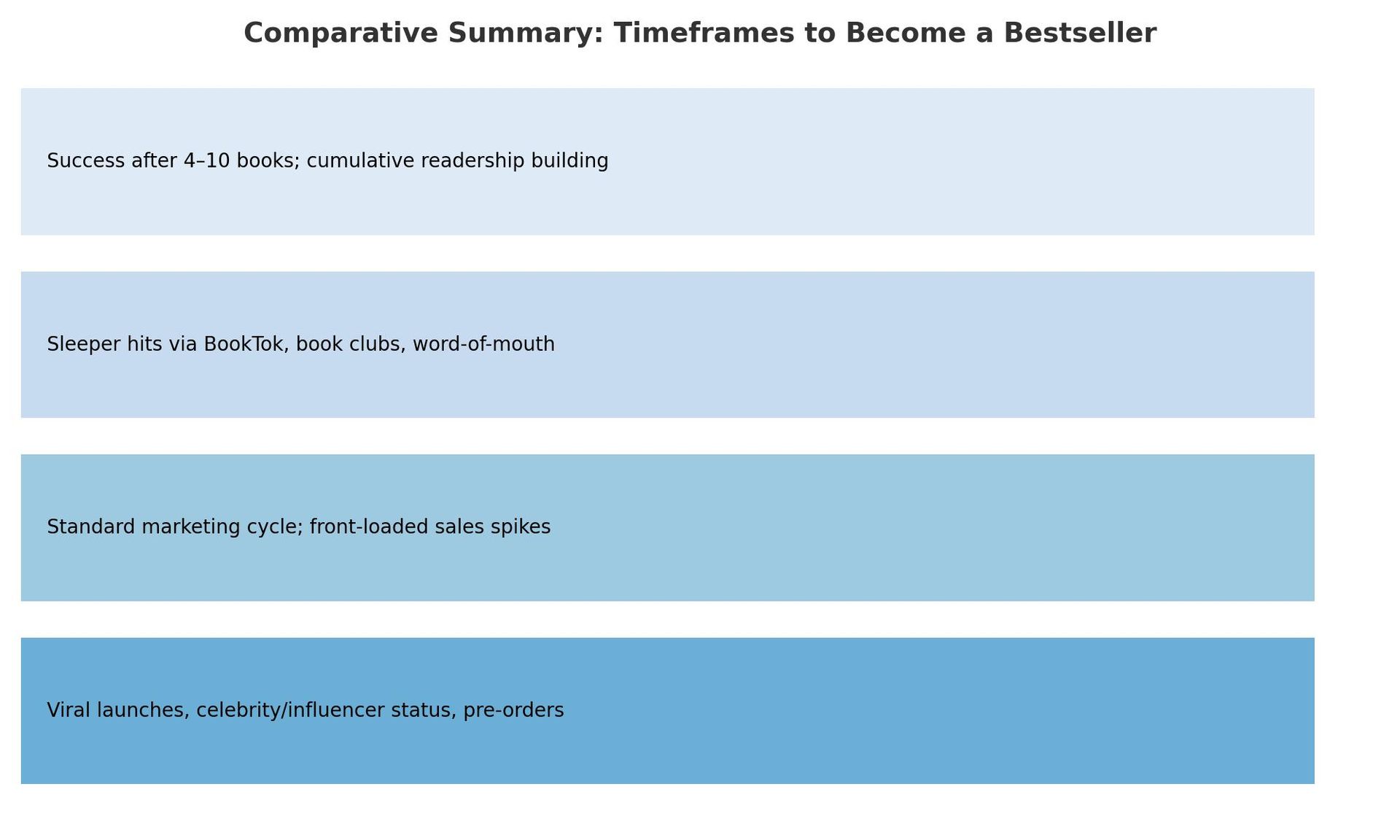How Long Does It Take to Become a Bestseller?
Ad
The path to becoming a bestselling author is often misunderstood. Popular narratives highlight “overnight” successes, but industry data suggests a far more complex, multi-year trajectory shaped by sales thresholds, author backlists, genre, and reader behavior.
What is a Bestseller?
The first analytical challenge is definitional - “bestseller” status varies by platform.
New York Times (NYT) - Typically requires 5,000–15,000 copies sold in a single week, though the editorially curated list also excludes bulk orders and can weigh bookstore diversity.
Wall Street Journal (WSJ) - Often 3,000–6,000 copies in the first week.
Amazon KDP - A more fluid algorithmic ranking, where a book can claim a category bestseller badge within hours if it outsells others in a specific niche.
Thus, “time to bestseller” cannot be generalized without contextualizing which list is being referenced.
Data on Timeframes
1. Immediate Success (1 Day – 1 Week) - In rare cases, books become bestsellers within hours of release. This usually occurs due to:
- Large pre-order campaigns,
- Established platforms (celebrities, influencers),
- Media tie-ins.
For example, Brisbane baker Brooke Bellamy became a bestseller within 24 hours of release, driven by her large following.
While noteworthy, such instances represent outliers rather than industry norms.
2. Typical Trajectory (1–3 Months) - For midlist authors, industry research indicates that sustained marketing, reviews, and distribution usually yield bestseller status within several weeks to a few months.
A 2018 study in EPJ Data Science analyzing NYT bestsellers found:
- Sales generally peak within the first 2–6 weeks post-release.
- Bestseller status, if achieved, occurs during this early period, with sharp declines after ~10 weeks.
- This suggests that most bestsellers are front-loaded phenomena rather than slow builds.
3. Delayed Recognition 6–12 Months (“Sleeper Hits”) - A subset of books reach bestseller lists months after release, often through organic discovery:
- Book clubs (e.g., Reese’s Book Club, Oprah’s Book Club),
- Social platforms such as BookTok,
- Word-of-mouth reviews.
The Midnight Library by Matt Haig gained bestseller traction months after publication, largely due to TikTok virality.
4. Multiple Book Build: Years - For many authors, bestseller success is cumulative. Data supports this:
According to EPJ Data Science, 65% of nonfiction bestsellers were debut works, but in fiction, many authors did not reach bestseller status until their 4th or 5th book.
Reddit’s writing community echoes this reality: “Most authors who eventually gain bestseller sales do so after publishing 5 to 10 books…”.
An illustrative example is Rebecca Ross, who published seven books before achieving NYT bestseller status with Divine Rivals in 2023.

Conclusion
Analytically, the evidence is clear: while overnight bestsellers exist, they are statistical anomalies. The modal pattern shows that bestseller status, particularly for NYT emerges within the first 2–6 weeks post-launch. However, genres, platforms, and marketing resources significantly mediate outcomes.
From a research perspective, aspiring authors should treat bestseller achievement not as a single event but as a function of early sales velocity, platform strength, and long-term persistence.
Nora Roberts so aptly summarized -
You’re going to be unemployed if you think you just have to sit around and wait for the muse.
